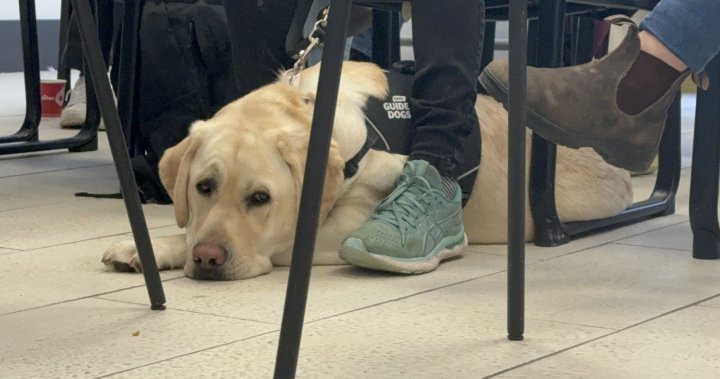General News
Graduating guide dogs lead the way for visually impaired pet owners in Halifax – Halifax

A group of hard-working pups celebrated a milestone at the Canadian National Institute for the Blind (CNIB) office in Halifax on Wednesday, as both pet-owners and dogs alike were in attendance to mark the end of their guide dog training.
The celebrations couldn’t have fallen on a better date, as the occasion also marked International Guide Dog Day.
Maxine Silva was thrilled to take the day to appreciate everything her dog Symba has done for her.
“For me, it opened a whole avenue of a life that allows me to be free and to meet new people, like at the CNIB,” she said during the event on Wednesday.
Silva has low vision — a condition that is difficult to remedy with prescription glasses or contacts — and initially thought she didn’t qualify for a guide dog because she isn’t fully blind.
“I always thought to get a guide dog you needed to be completely blind without seeing anything. I always felt a little guilty like I was taking a guide dog away from someone who needed that dog, but I need him too,” Silva continued.
Breaking news from Canada and around the world
sent to your email, as it happens.
The dogs undergo about two years of training before becoming a certified guide dog. Following the initial program, the canines then complete a matching process to get more familiar with their new owners.
Maria Power was matched with her dog Dexter in February. She said it took a lot of dedication to learn how to work as a team.
“You have to have the trust and the skills, and you have to work together and as time goes on, then you become a team,” she said.
The guide dog course costs the CNIB around $50,000 dollars. As the non-profit organization continues to experience skyrocketing demand for the service, many applicants need to wait for up to four years before being partnered up with their furry friend.
“There are many people on the list that can’t get a dog for a period of time and maybe never, depending on the demand,” Silva said.
CNIB says that one of the reasons for a shortage of guide dogs is a lack of volunteer puppy raisers.
Laura Kennedy, a supervisor for the puppy training course, said that a need for more volunteers is hindering the number of guide dogs that the program can produce.
“We’re almost always in need of volunteer puppy raisers … certainly right now,” she said. “The more volunteers we can get in, the more dogs we can get into the hands of Canadians with sight loss.”
© 2024 Global News, a division of Corus Entertainment Inc.
Source
Disclaimer: No copyright infringement intended. All rights and credits reserved to respective owner(s).


























